testosterone
men's levels have been dropping for decades. some thoughts on why.
there are a number of worrying changes that have occurred in american hormone levels over time and several have been well studied and documented. one is the serious drop in testosterone levels in men. everyone knows it’s going on, but “why” remains a more open question than one might expect. you’d think this would be being studied exhaustively, but it’s still sort of a fringe topic which has long struck me as odd. some have posited that this implies some sort of conspiracy, but i suspect it’s likely as simple as “there’s just no money in knowing the answer/fixing it” and so no one really spends the time. there may also be some inconvenient truths tied up in here as well. i do not intend this piece to be any sort of exhaustive examination or definitive conclusion. rather, let’s look at what we ought to be looking at and perhaps get a sense of how one might think about thinking about this.
testosterone is a critical hormone for men and women. reducing it reduces muscle mass and increases fat (a spiral as high fat, low muscle also reduces T). it also reduces confidence, sex drive, sex function, and general sense of well being. low T causes irritability, anxiety, depression, poor emotional regulation, fatigue, mental fog, and a veritable laundry list of other bad outcomes. testosterone is good stuff. you do not want to lose it.
but we are. sharply.
this classic STUDY from 2007 started ringing some alarm bells. (red arrows mine)
they cross sectioned men through 3 time slices so for differences, you can see both how each group at a given point in time lost T as a function of age and also how later groups were much lower than those who came before them. a man of 55 in 2002-4 group had lower T than even a 70 year old in the 1987 group.
some had posited that “well, this is just living longer and an issue for older men” but it’s not.
this recent STUDY shows that it is not just aging. they looked only at young men and adolescents. and T is dropping like a rock. numbers over 600 ng/dl were typical in 1999-2000. by 2011-12 they had crashed to the low 400’s. that’s massive loss. no way that is not having a HUGE effect on bodies, obesity, energy, mood, confidence, cognition, and who knows how many other things.
assuming comparability (which i’m not positive about but that seems roughly on), 20 somehtings in 2011-12 had T levels that were typical of 70 year olds in 1995-7 and levels so low that men in the 1980’s might never have hit them in their whole lives
this new lower level then stabilized and perhaps improved slightly in the next 5 years.
a core driver here has surely been the enfattening of america and large drops in physical activity from exercise and from work, but this issue with young men was not just lack of exercise and obesity. this result was highly statistically significant even when adjusting for those confounders. there is something else going on as well.
a drop this sudden is extremely provocative. there’s no way it was genes or selection or society. there’s no way it was just getting fat and low activity. that simply could not have changed fast enough to cause this sudden shift.
such a move points to some sort of exogenous driver.
many possible causes have been suggested: more exposure to phytoestrogens, other dietary issues, exposure to estrogen in food/water systems, environmental toxins, etc. there may be some truth to a lot of this, but it’s hard to peg and quantify and much of it is pretty speculative. in the young, this drop goes sharp right when social media became a lifestyle, but that would not explain the drops in the 70+ group.
this whole system is almost certainly highly multi-factorial, but another aspect of the data popped for me and may give us some clues as to where to look/what to look at.
one can often impute things by looking for variances between median and mean. in general, median dropped more than mean. this tends to point to a generalized effect (like obesity or inactivity) vs a small group being heavily affected and dragging the average down. this is not “good grades but a zero on one test” but rather “test scores dropped all semester for a great many people, but likely a few high performers were relatively or fully unaffected.”
the fact that the number of folks with <300 ng/dl rose so much from 4% in 1999-2000 to over 23% in 2011-12 had been making me think we might be looking for a subgroup that got hit hard and dragged the average down, but the overall data seems to show the opposite and that surprised me. it also got me to thinking.
looking back at the older data from the 80’s and the characteristics of the people in the cohorts, i was struck by several things:
there was some weight gain, but it was not dire and waist to hip was fairly consistent
there was a rise in heart disease and hypertension
but the biggest rise in descriptive statistic was one that worries me and that seems widely ignored in and absent from the literature on this topic: prescription medications taken. that went absolutely bonkers.
in the 80’s, 3% of people took 6 or more drugs. 38% took none at all and 79% 2 or fewer.
by 2002-4, 25% were taking 6 or more and a startling 0% were taking none.
this data seems not to have been collected (or at least not shared) in the newer study. those of a suspicious bent might wonder about why, but i know of no specific reason and it could also easily have simply been “we did not think to ask young men about this.”
obviously, we’re starting to play a bit of “this correlation proves that my hobbyhorse is causal” here, but this notion of pharma induced T loss is not an idea to dismiss lightly. a great many drugs that people take are known to suppress testosterone and i find the way that those over 70 saw T absolutely plummet to the point of an entirely new curve shape in 2002-04 vs 1995-97 provocative as that’s the demo that tends to get the most pills.
this could also explain the younger men, even adolescents as pharma use in young people has been rising rapidly and many of the drugs they take are known to drop testosterone levels.
the timing on this one is about right.
and current levels are much higher and rise sharply in over 60’s, but the figures are also lower for men. this may be playing a role, but i doubt very much it could be causing this whole issue.
but perhaps it’s sort of a pile on.
in addition, statins (anti-cholesterol drugs), among the most prescribed drugs in human history, seem to affect testosterone negatively. (though the data is messy and mixed)
researchers say “not enough to cause a significant deficiency” but when you are taking 6+ drugs, perhaps you get enough straws to break a camel’s back (and perhaps the effects can be multiplicative or cause cascades). even ibuprofen comes in for implication (though this one is complex as it seems that ibuprofen causes compensated hypogonadism by suppressing testicular endocrine function but this may be offset by pituitary upregulation of luteinizing hormone (an ability that might wane with age). additives in many consumer products (notably lotions and suncreen, a product whose use has exploded in this timeframe) are also implicated as endocrine disruptors but the evidence seems mixed and i have not been deep into it yet.
all in all, this is a highly complex system. endocrine effects make even lifelong subject matter experts wave their hands and say “and then magic happens” sometimes. they’re so complex, so interrelated, and so impossible to unwind as second and third and eleventh order effects as to be almost impossible to predict once you get into anything multi-factorial. this is, of course, a good reason not to poke your endocrine needlessly and this practice has become awfully common for docs and pharma as often from negligence as deliberation.
let’s be clear:
i am not saying we can prove that it’s pharma causing the big drops in testosterone.
what i am saying it i suspect it’s a good bet that it’s contributing and that cavalier use of drugs that suppress basic body functions like mood regulation, endocrine function, blood pressure, cholesterol, and who knows what else is not a great plan. i’m by no means anti-pharma, but i do think it’s radically over and mis used.
what WOULD start to give us dispositive data on this is taking the study results and regressing them against pharma use. do people taking 6 drugs see greater drops than those taking 1 or none? are some drugs specifically implicated/associated? (of course, it could also be a cross association of “sicker people having lower T and taking more drugs)
this would be a great big data/learning model project for someone that had the source material, but i have no seen and large scale work. (if you have, please share)
in the meantime, many are probably asking “so what am i supposed to do here?”
mostly, the answer is “take care of yourself in a manner your grandparents would have recognized.”
you want the T your dad and grandad had?
eat well. eat simple, whole foods in reasonable quantities. balance your nutrition.
exercise regularly. you want strong muscles and strong cardio.
stay lean.
get enough sleep.
and do not put drugs into your body that he did not unless you have a really good reason and understand the trade offs.
being on 9 prescription drugs is not safe “just because a doctor gave them to you.”
i am routinely stunned by how little MD’s understand about pharmacology, pharmacokinetics, modes of action, or even the basic side effect profiles of the products they prescribe. it’s really on you to stay on top of that.
look, obviously this does not work in all cases and some pharma is useful and needed in many circumstances, but as a base prior, first seek to fix issues with your health through lifestyle and diet, not medication.
this is one of those things doctors all used to know and seems to have forgotten (or perhaps despaired of as patients all want the quick, magic pill fix). don’t be that patient. the health you save may be your own.



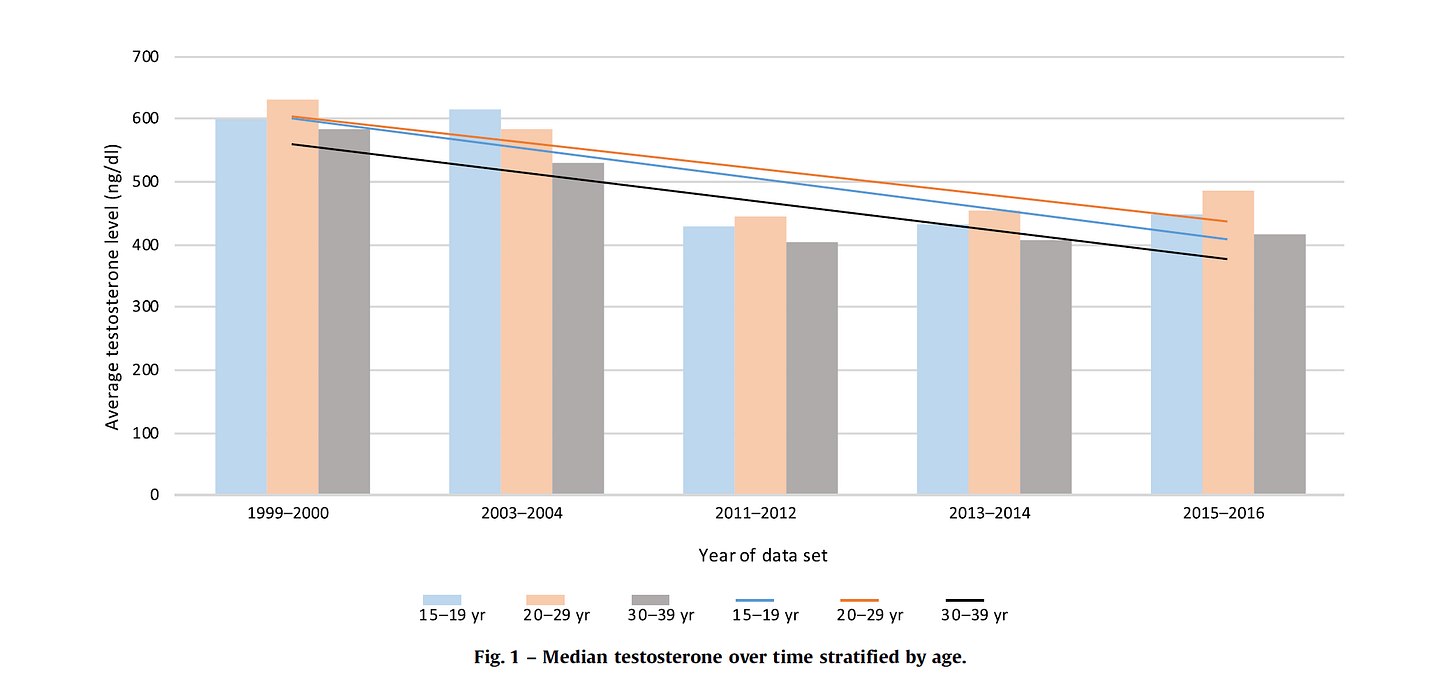
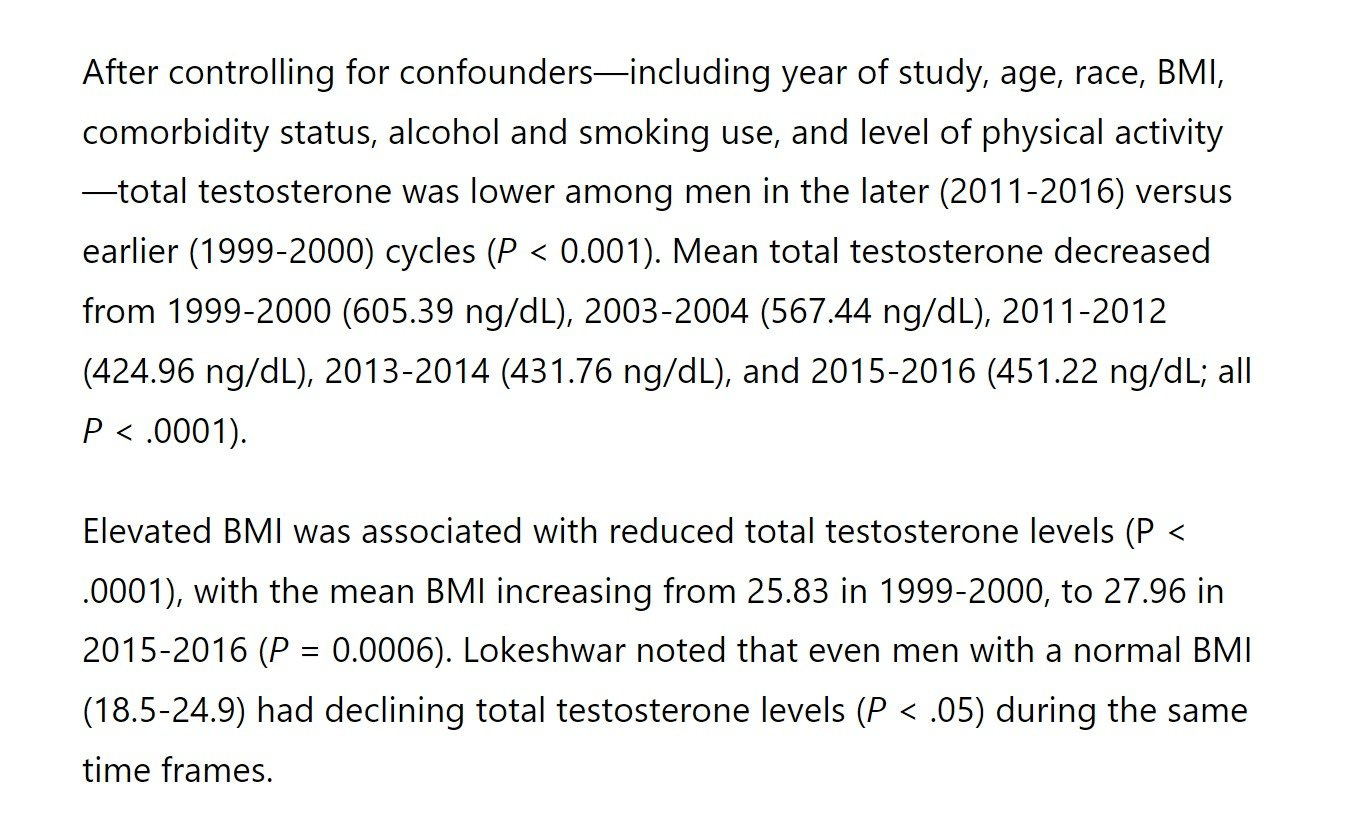
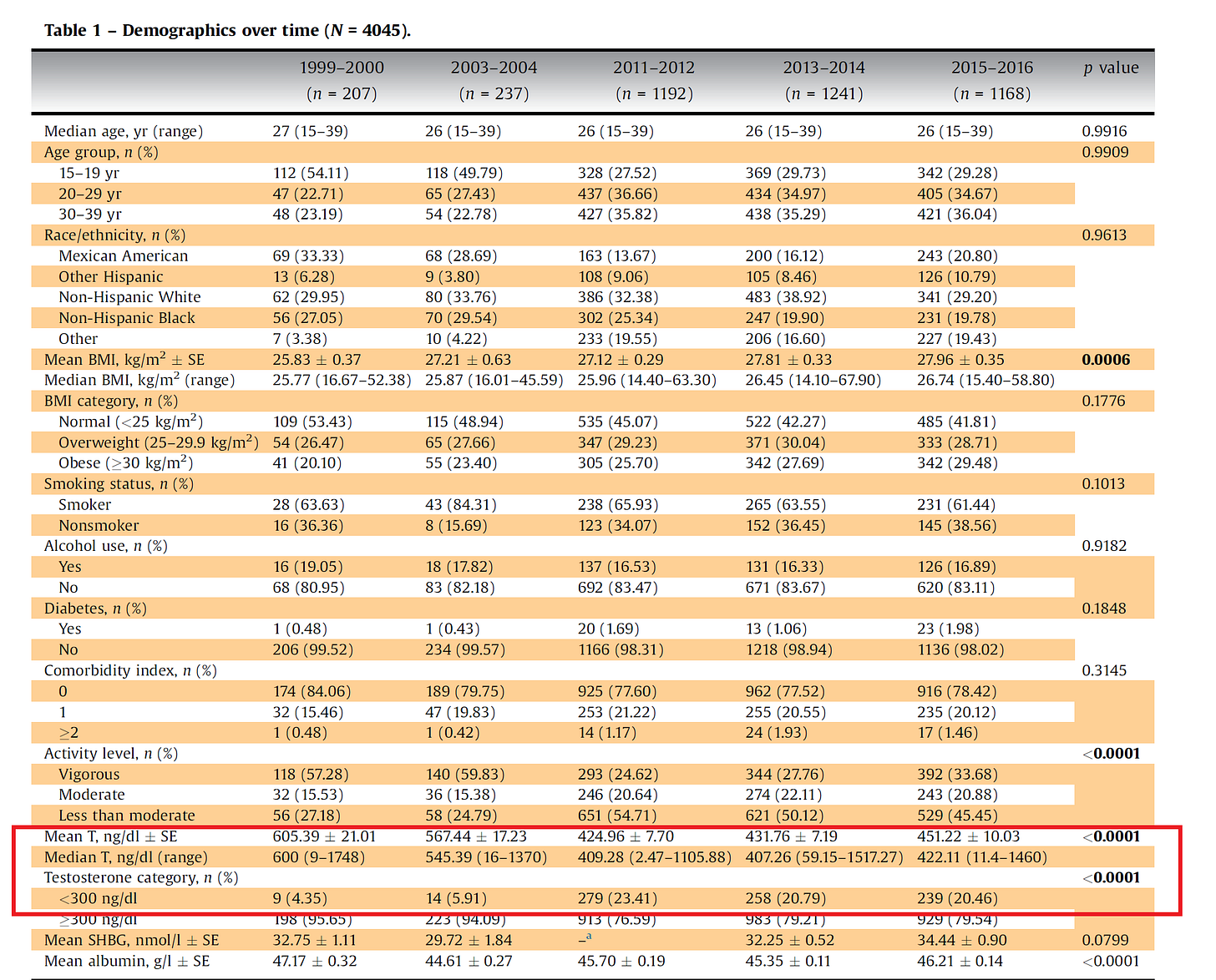
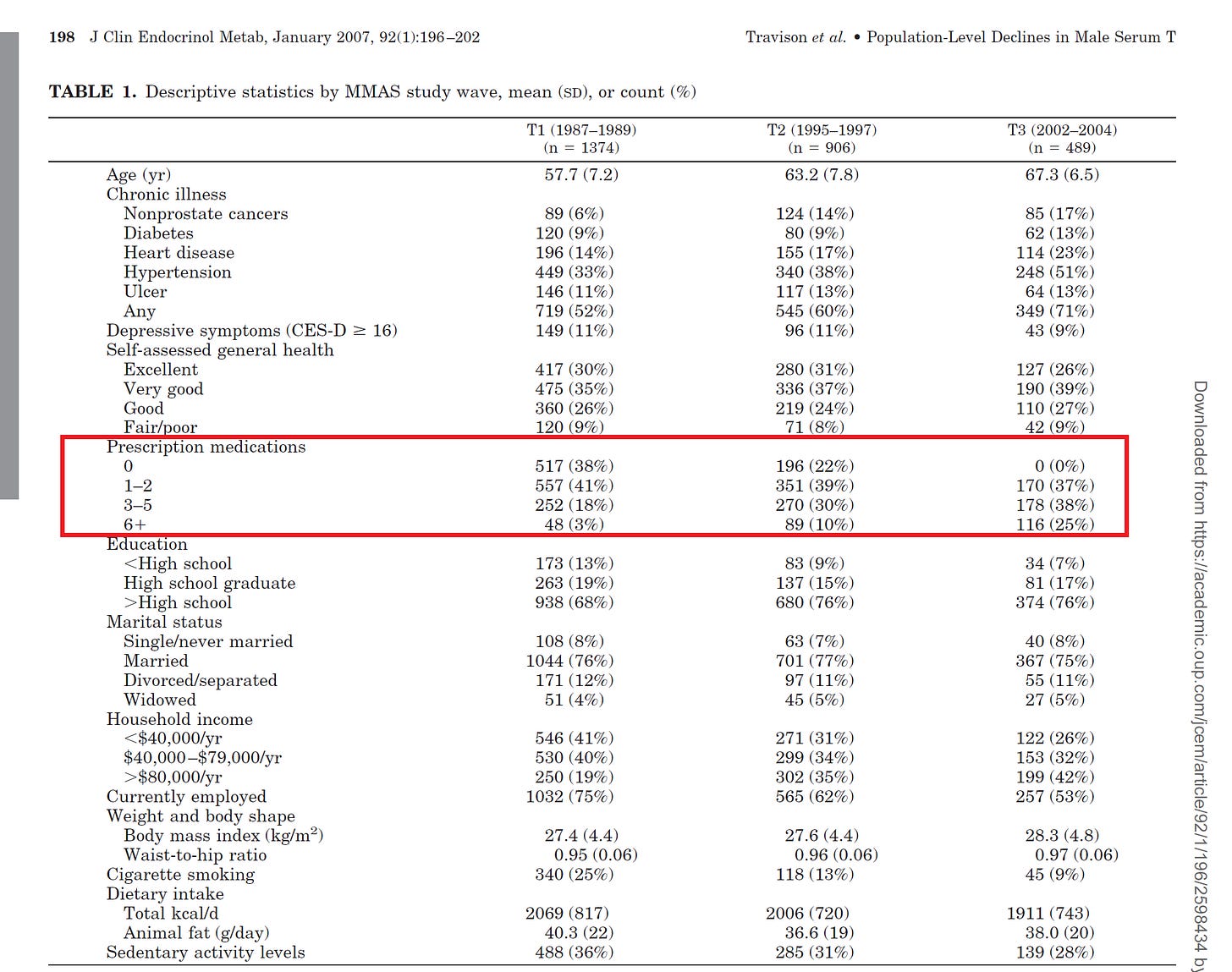
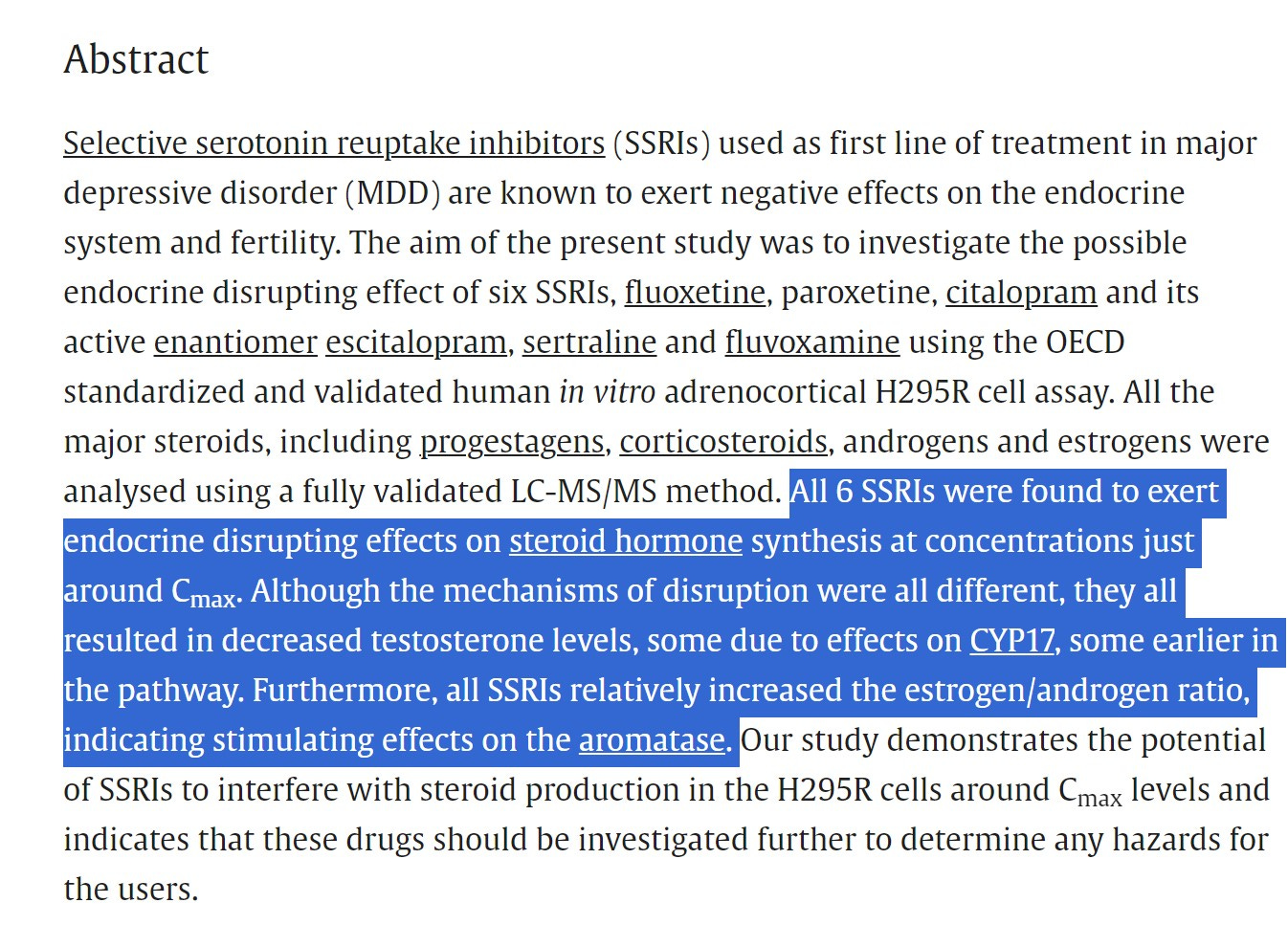
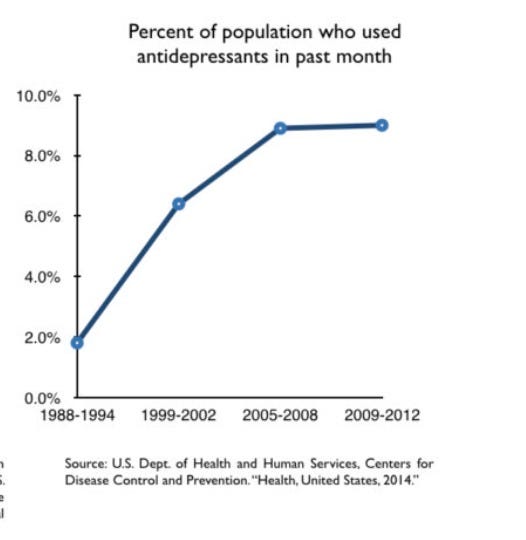
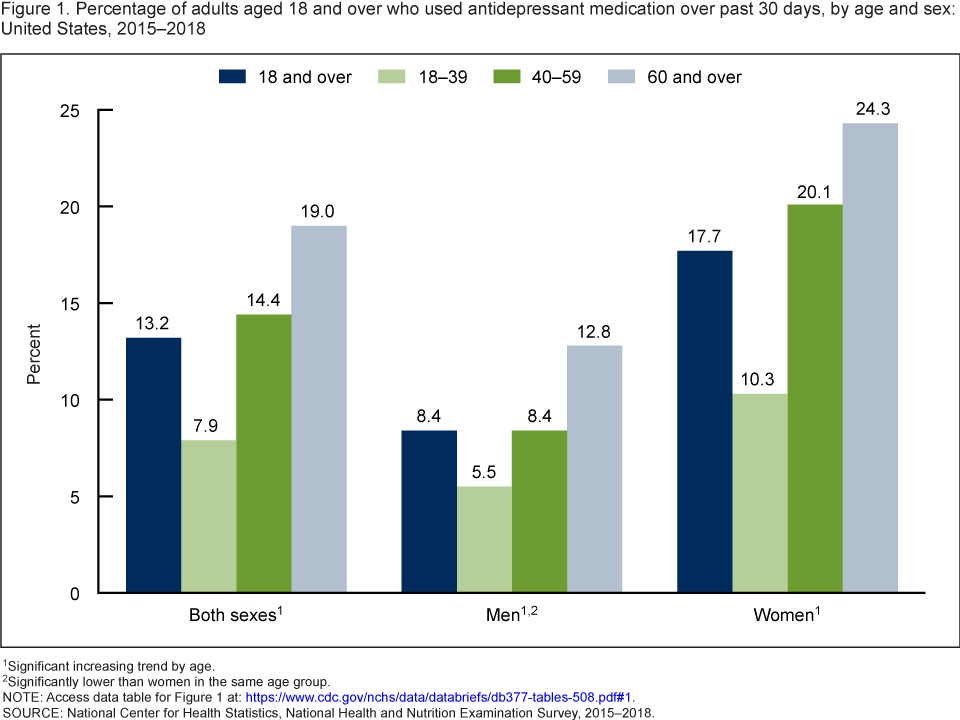
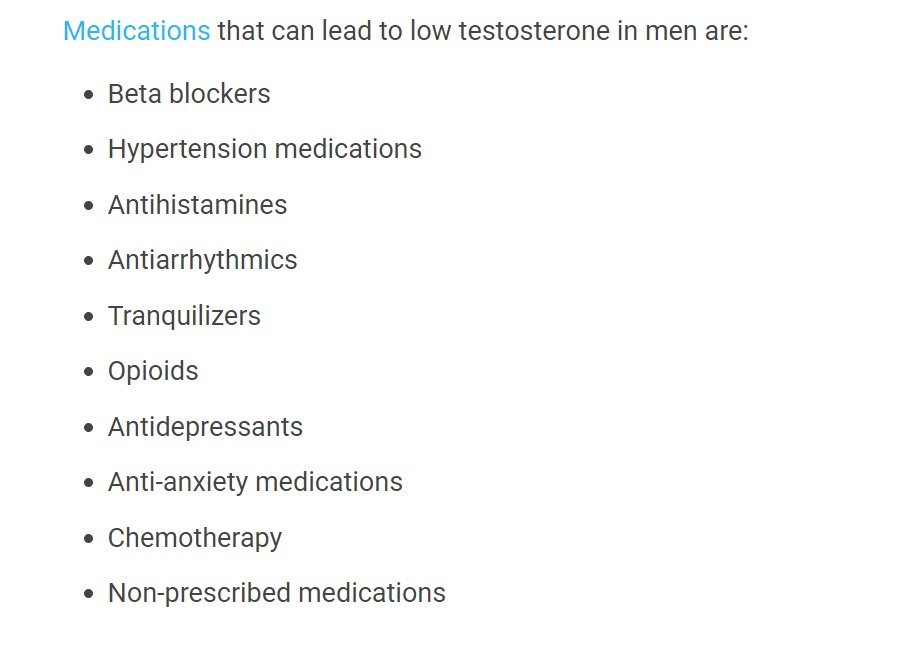
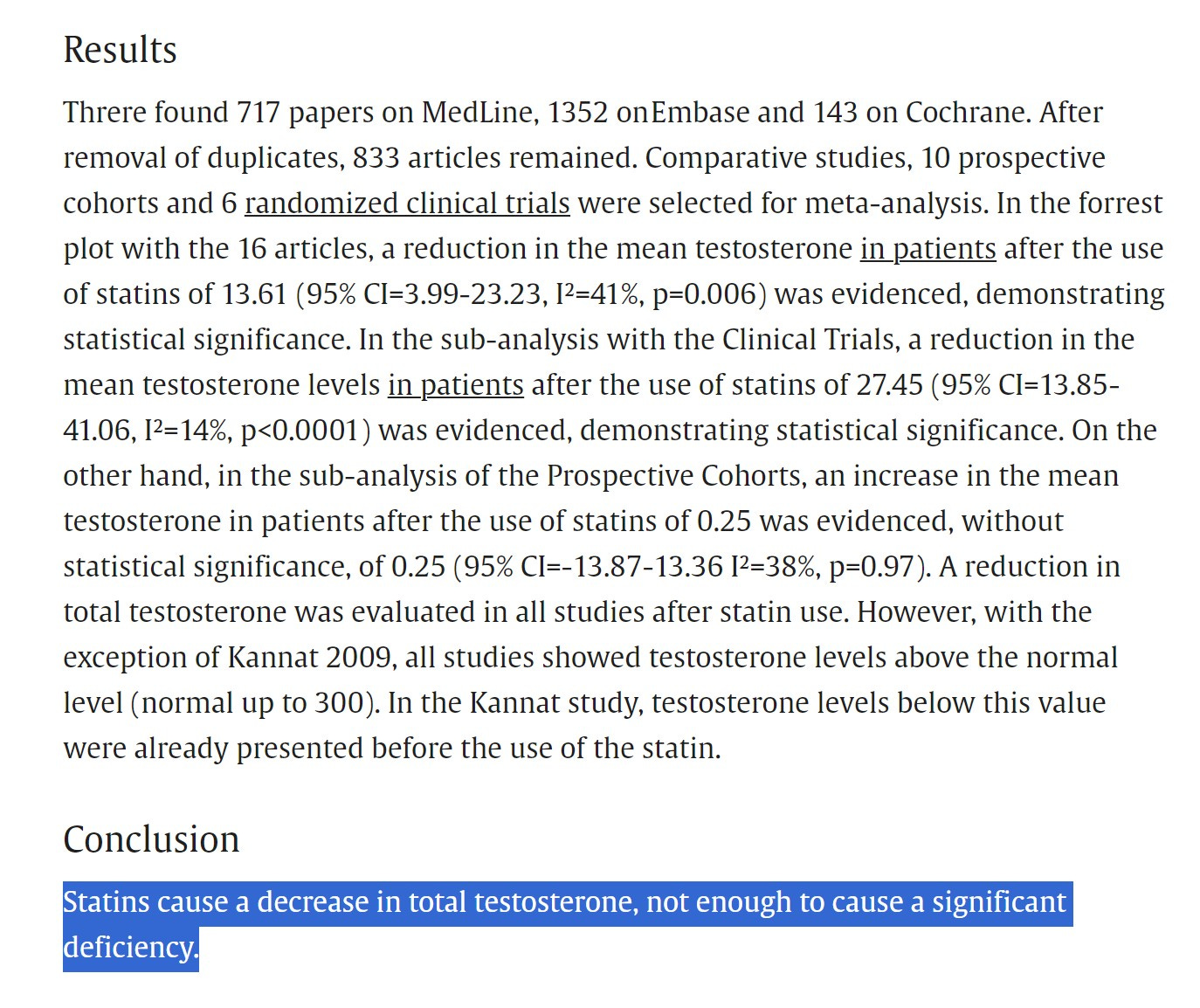

Sunlight, nicotine, and sex help too. Avoid too much alcohol and weed. Low T is a crisis that has resulted in soy boys and Karens turning our institutions into dysfunctional longhouses.
Pharma is probably one factor. As you said, it's likely multifactorial: dude weed probably plays a role; the witch's brew of xenoestrogens and endocrine disruptors in pesticides, herbicides, industrial chemicals, and plastics; sedentary lifestyles and processed foods contributing to obesity (as you noted, a double-whammy there); and also probably sociological factors. By the latter I mean that we live in a feminized gynarchy that punishes masculine behavior as "toxic", which probably acts as a psychological toxin. It's hard to feel highly masculine when you're constantly tiptoeing around the delicate emotions of bitter scolds whom you know full well hold all the economic and legal cards.
If I had to pick one as the major factor, though, I'd probably go with chemicals and plastics, as this has the most universal effect, and they've been in the environment going back to when T first started to plummet.